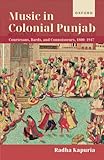Music in colonial Punjab : courtesans, bards, and connoisseurs, 1800- 1947 / Radha Kapuria.
Publisher: New York : Oxford University Press, 2023Edition: First editionDescription: xxiii, 385 pages 22 cmContent type:- text
- 9780192867346
- 780.954
| Item type | Current library | Shelving location | Call number | Materials specified | Status | Notes | Barcode | |
|---|---|---|---|---|---|---|---|---|
 BOOKs
BOOKs
|
National Law School | General Stacks | 780.954 KAP (Browse shelf(Opens below)) | HB | Not For Loan | Recommended by Dr. Manpreet Singh Dillon (Academic Fellow) | 39493 |
Browsing National Law School shelves,Shelving location: General Stacks Close shelf browser (Hides shelf browser)
List of Figures;
Acknowledgements;
Note on Translation and Transliteration;
Prologue;
Introduction;
1:Of Musicians, Dancers, and the Maharaja: Gender, Power, and Affect in Ranjit Singh's Lahore;
2:Mirasis, Missionaries, and Memsahibs: Folklore and Music in Colonial Punjab;
3:Gender, Reform, and Punjab's Musical Publics: Colonial Lahore, Amritsar, and Jalandhar, 1870s-1930s;
4:Princely Patronage and Musicians: Modernity and Circulation in Colonial Patiala and Kapurthala;
Conclusion;
Bibliography;
Index.
"This book offers the first social history of music in undivided Punjab (1849-1947), unearthing new evidence to argue for the power of female performers and the primacy of classical music for a region conventionally understood as a centre of folk music alone. It maps the historical journey of musicians and dancers in colonial Punjab-whether mirāsī(community of bards), kalāwant (higher-status musicians), kanjrī(subaltern female performers), or tawā'if (courtesans)-from the prominence of Pul Kanjri during Maharaja Ranjit Singh's reign in the early nineteenth century, to the emergence of the Patiala gharānā (musical lineage) as the epitome of musical excellence in the early twentieth. The volume examines the history of Punjabi socio-musical reform by the newly emerging Anglicized middle classes-whether Hindu, Muslim, or Sikh-and the engagement of British colonial administrators with Punjab's musician and performing communities. The author reveals the inherently diverse composition of musical connoisseurship in Punjab and positions gender and caste at the heart of the musical transformations wrought by colonialism in the region. Combining insights from history, ethnomusicology, sociology, literature, and geography, Music in Colonial Punjab provides a unique perspective on the social history of an activity that still unites a fascinating region today divided between the rival nation-states of India and Pakistan"-- Provided by publisher.
There are no comments on this title.







